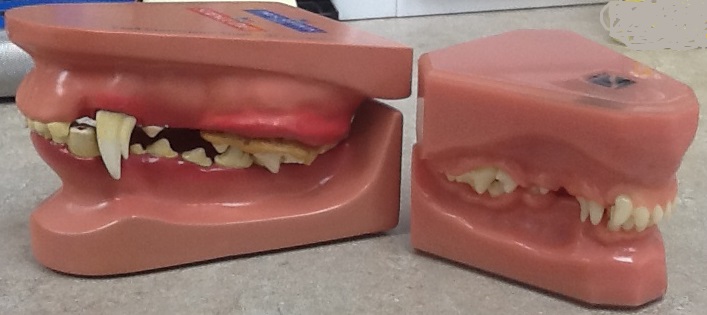Oral Health is Vital to Overall Health!8 out of 10 pets has some form of dental disease!
Periodontal disease is the MOST common clinical condition diagnosed in pets! Dental disease is the accumulation of soft plaque (composed of bacteria and food particles from the mouth) onto the tooth surface. Over time, the plaque mineralizes and becomes very hard tartar (hard brown crusts on the teeth). Then, the bacteria in the tartar pushes down between the gumline and the tooth causing periodontal disease: gingivitis (swollen, bleeding gums), bad breath, dental pain, and loose teeth. Most forms of periodontal disease are not reversible and the teeth are extracted to prevent further infection in the jaw bone and other areas of the body (kidneys, lungs, and heart). Cat caretakers should visit our section on Dental Resorptive Lesions to learn more about this painful tooth lesion seen in up to 60% of cat populations. |
Common Dental Misconceptions
1. Feeding dry food is enough to prevent dental disease.
-False! While feeding dry kibble may lead to less dental disease than a strictly canned or “wet” diet, just eating dry kibble alone will not be enough to prevent dental disease (unless it is a VOHC approved dental diet such as Hills Science diet T/d). Think of it this way- if you just ate hard food, would your dentist tell you that you no longer needed to brush your teeth? VOHC approved dental diets are different than regular kibble due to their unique internal structure.
2. Bad breath in pets is normal.
-False! Bad breath is NOT normal in pets and often indicates the presence of dental disease! It is the bacteria from dental infection that smells bad. Bad breath odor may also indicate internal disease such as uncontrolled diabetes. Talk to your veterinarian if you have questions.
3. My groomer brushes my dog's teeth so I don't have to.
-False! While it is nice that your groomer offers this service, a brushing every 4 to 8 weeks when your dog is groomed is NOT sufficient to prevent dental disease. What would your dentist say if you only brushed once a month? Pet dental brushing needs to be done as often as possible (at least a couple times per week) if it is going to be effective at all. If your pet won’t allow more frequent brushing or you can’t squeeze time in your schedule, please consider other dental prevention options- talk to your veterinarian for recommendations.
4. Chewing on bones is good for my dog's teeth.
-False! While chewing is good, we generally do not recommend for dogs to chew on real bones or deer antlers. These are often too hard and can lead to fractured teeth, which then require surgical extraction. Chews that you provide for your dog should have a little “give” to them- you should be able to slightly flex them in your hands. Talk to your veterinarian for advice.
5. Dog and cat teeth grow continuously throughout their life.
-False! Dog and cat teeth do not continuously grow. Dogs and cats have “baby teeth” which will be replaced by “adult teeth” around 4 to 6 months of age. If you think that your pet’s teeth are getting longer- this can be a sign of periodontal disease (infection around the tooth root can make it appear as if the tooth is slowly being extruded from the socket or the gumline may be receding- the tooth may not be obviously loose when this happens because of how long the roots are, but the infection is significant!).
1. Feeding dry food is enough to prevent dental disease.
-False! While feeding dry kibble may lead to less dental disease than a strictly canned or “wet” diet, just eating dry kibble alone will not be enough to prevent dental disease (unless it is a VOHC approved dental diet such as Hills Science diet T/d). Think of it this way- if you just ate hard food, would your dentist tell you that you no longer needed to brush your teeth? VOHC approved dental diets are different than regular kibble due to their unique internal structure.
2. Bad breath in pets is normal.
-False! Bad breath is NOT normal in pets and often indicates the presence of dental disease! It is the bacteria from dental infection that smells bad. Bad breath odor may also indicate internal disease such as uncontrolled diabetes. Talk to your veterinarian if you have questions.
3. My groomer brushes my dog's teeth so I don't have to.
-False! While it is nice that your groomer offers this service, a brushing every 4 to 8 weeks when your dog is groomed is NOT sufficient to prevent dental disease. What would your dentist say if you only brushed once a month? Pet dental brushing needs to be done as often as possible (at least a couple times per week) if it is going to be effective at all. If your pet won’t allow more frequent brushing or you can’t squeeze time in your schedule, please consider other dental prevention options- talk to your veterinarian for recommendations.
4. Chewing on bones is good for my dog's teeth.
-False! While chewing is good, we generally do not recommend for dogs to chew on real bones or deer antlers. These are often too hard and can lead to fractured teeth, which then require surgical extraction. Chews that you provide for your dog should have a little “give” to them- you should be able to slightly flex them in your hands. Talk to your veterinarian for advice.
5. Dog and cat teeth grow continuously throughout their life.
-False! Dog and cat teeth do not continuously grow. Dogs and cats have “baby teeth” which will be replaced by “adult teeth” around 4 to 6 months of age. If you think that your pet’s teeth are getting longer- this can be a sign of periodontal disease (infection around the tooth root can make it appear as if the tooth is slowly being extruded from the socket or the gumline may be receding- the tooth may not be obviously loose when this happens because of how long the roots are, but the infection is significant!).
Some common signs of Dental Disease: Teeth covered in brown tartar, bad breath, loose or discolored teeth, decreased willingness to chew, bleeding gums, loss of appetite or weight loss, drooling or dropping food, or discomfort when touched in the mouth area. Be aware that not all pets will exhibit all of these symptoms.
|
|
Talk to your vet about dental prevention measures you can take at home! These may include:
|
|
|
|

